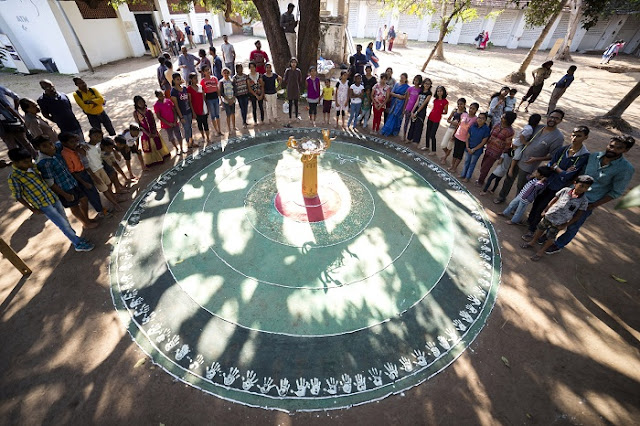 |
| “Pakshi Kolam Padayani’ as part of Art By Children (ABC) workshop at Aspinwall House,Fort Kochi |
In an effort to introduce children to traditional art forms that are rapidly fading out, the Kochi Biennale Foundation’s Art By Children (ABC) initiative recently conducted a workshop that featured ‘Kalam’ and ‘Pakshi Kolam’, two of the oldest such forms in Kerala.
Helmed by noted artist Prabhakaran Thiruvalla, the three-day workshop titled ‘Coo Whoo’ held at the Architectural Pavilion in Aspinwall House showcased the ‘Kalam’ drawing style. Meaning ‘circle’, the form is rooted in the worship practices at ‘Kaavu’ shrines found in the wilderness.
“Such shrines devoted to local deities are spaces where tradition, culture and rituals meet and
thrive. Kalam is one such traditional practice where drawings are made inside a big circle to please the deity. The form can’t be separated from nature as all the colours and materials used are natural,” said Prabhakaran, who has been drawing in the ‘Kalam’ style since his childhood.
 |
| Children drawing 'Kalam' as part of ABC workshop at Aspinwall House,Fort Kochi |
Over the weekend, the training progressed through various stages of drawing techniques, the use of charcoal and natural colours and making shapes using coconut leaves and Banana corms.
“In a world where plastic is preferred even as an art material, the use of natural materials like coconut leaves is a step back towards eco-friendly practices,” said Arjunan Marthali, a member of Thrissur folk music troupe ‘Karinthalakootam’, who helped the children with shape-making.
The workshop concluded on Sunday with a ‘Pakshi kolam’ performance by Bharavi Padayani Sangam. ‘Pakshi Kolam’, a variant of the distinctive ‘Padayani’ dance form, is an indigenous ritual performance art practiced in the Central Travancore region, where a nest with artificial eggs is placed on a raised wooden piece in the centre of a circle, or ‘Kalam’.
 |
| Children drawing 'Kalam' as part of ABC workshop at Aspinwall House,Fort Kochi |
“For this ‘Pakshi Kolam’ performance at the Biennale, we have included drawings of birds and other shapes we see in daily lives. The story of the bird hesitant to incubate its eggs represents modernity, where people don’t have time to care for fellow beings or even their children. The music represents the drive to grow despite all adversities and live on one’s own terms,” said Gopinathan, a member of the Bhairavi Padayani Sangam, which conducted the performance.
The workshop was the latest in an ongoing series of uniquely themed art education and activity clinics organised by ABC and powered by official outreach partner Merck. Earlier last week, there was a storytelling show and craft workshop, featuring Story Lorry from Palakkad.
“It is wonderful to impart knowledge about our traditional stories and art forms to children who are unaware that such art practices exist in Kerala. Even some of the parents who were in attendance were not familiar with these forms,” said Manu Jose, head of the ABC programme. “Besides the interactive styles and engagement techniques, it is the addition of the traditional to the innovative that makes ABC different from other art workshops,” Jose said.
Comments
Post a Comment